On Tuesday night, the Irish Farmers Journal kicked off a spring series of suckler meetings in Co Leitrim. The importance of the sector and the continued commitment to it by farmers was clear from the large attendance.
As one farmer reflects on our letters page, suckler farmers feel under attack from all sides. Poor beef prices and continuous attempts to undermine the quality of the product is causing real frustration among farmers.
However, for many, the most frustrating aspect is the continuous portrayal of the sector as a sunset industry. The reality is that for the majority of farmers in Leitrim, as in many parts of the country, suckling is far from a sunset industry. Instead, it is a sector that provides a vital source of income to their families and lifeblood to their towns and villages.
In other parts of the country, farmers have embraced the opportunities that dairy expansion has presented but it is important to acknowledge that the dividend from the abolition of milk quotas has not been spread evenly across the country.
Some will argue that this dividend can be spread wider by encouraging farmers to reduce suckler cow numbers and instead provide support services to the dairy sector, in the form of contract-rearing or taking dairy progeny through to beef.
The focus should not be on producing a small cow but instead one that is functional and suited to the production environment
The fact that progeny from the dairy herd formed the backbone of our beef sector in the 1970s and 80s has often been highlighted. But this ignores two important factors: firstly, the dairy cow of 30 years ago had far superior beef traits than is the case today; secondly, farmers had access to growth hormones to improve growth rates and carcase conformation of plainer dairy-bred stock. With the current genetics being used on farms, dairy-beef production is not an economically viable alternative to suckling.

Vet Marie Louise Ryan and beef editor Adam Woods speaking at the Irish Farmers Journal suckler meeting in Leitrim on Tuesday. \ Brian Farrell
So, what are the options for the 400 Leitrim farmers that attended our demonstration on Tuesday night, and indeed the 64,000 farmers with suckler cows? For some, it will be to convert to dairy; for others, contract-rearing calves will be an option. But the reality is that for the vast majority, it will be staying with suckling.
While top of the agenda has to be restoring the level of support provided to these farmers, we have to recognise the failings of the past, where many of the supports were structured in a way that actually incentivised poor practices rather than helping improve on-farm efficiency.
At present, farmers have the opportunity to participate in the Beef Environmental Efficiency Pilot (BEEP). Adam Woods goes into detail on what is required from farmers. Some have criticised the scheme for the lack of funding, which currently stands at €20m. Given the income challenges facing the sector, it is a fair criticism.
However, others have warned farmers not to participate amid fears that weighing cows is the first step to the introduction of a carbon tax on the sector – a view fuelled by the concern that in the context of climate change, the Government’s agenda is to reduce suckler cow numbers to allow future expansion in dairying.
However, we cannot look past the fact that the weight recording measures required under BEEP will deliver an economic and environmental dividend. At farm level, the performance of the calf and subsequent weaning weight is a key driver of output from the suckler herd. Our MartWatch data consistently shows that high weaning prices are underpinned by a factor of weight and conformation.
On the issue of cow size, the focus should not be on producing a small cow but instead one that is functional and suited to the production environment. For most farmers, this will be a 650-680kg cow that can consistently produce a weanling at 300-320kg every year.
Meanwhile, being in a position to prove the environmental dividend from better breeding will give farmers a much stronger argument when it comes to securing direct support for the suckler cow under the environmental schemes introduced in the next CAP. If there is poor participation in BEEP, it will certainly make the argument for introducing a meaningful suckler cow support package much more difficult in Brussels.
Broadband: eir investment a boost but rural farmers left out
Private investment by eir in Ireland’s broadband network is welcome. As Thomas Hubert reports, the company will complete the connection of 335,000 rural homes, farms and businesses by June.
Executives have also revealed that this and further investment in the next five years will cover 80,000 to 100,000 customers previously thought to be dependent on the State-subsidised National Broadband Plan (NBP), mostly in urban areas with poor connectivity.
Company figures indicate that 450,000 customers will remain to be connected by the NBP after eir’s commercial rollout, instead of 530,000 at the latest Government count. While this may seem positive, it also leaves only the more remote farmers and rural dwellers to connect at the highest cost for the operator of the NBP.
The ESB-Vodafone joint venture, SIRO, pulled out of the NBP tender process in September 2017, months after eir announced its current rural broadband rollout.
Industry analysts widely saw the NBP’s narrower focus on the costlier customers as the reason for SIRO’s withdrawal at the time. eir subsequently left the process too.
The Government must now ensure adequate funding and commitment for the NBP to ensure its timely delivery to those who need it most, including the majority of Irish farms.
FTMTA show: latest technology
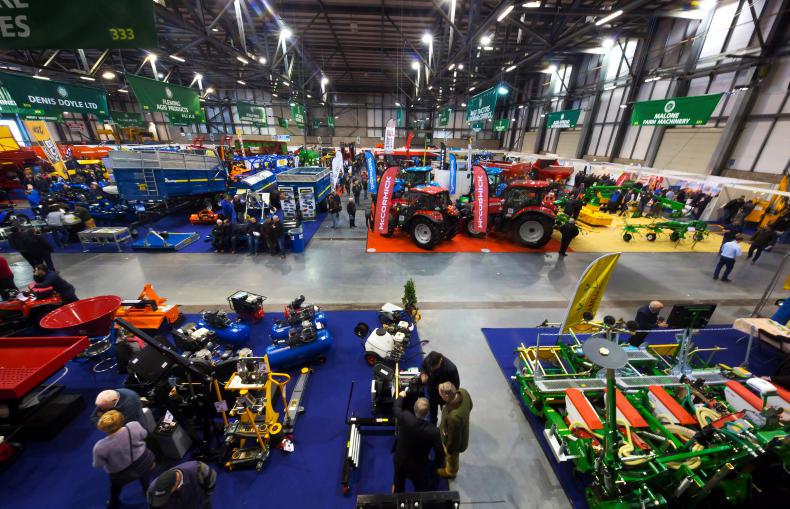
FTMTA Farm Machinery Show at Punchestown. \ Patrick Browne
In our Machinery supplement this week we carry extensive coverage of the FTMTA machinery show held in Punchestown last week. The well organised event provided farmers and contractors with the opportunity to see the latest equipment and interact with dealers and manufacturers in a relaxed environment.
Despite the uncertainties of Brexit, the mood was upbeat with the TAMS scheme certainly helping to drive demand for sprayers, cultivation equipment, fertiliser spreaders and low-emission spreading equipment.
As we report, the contribution that the McHale family has made to the industry was acknowledged with brothers Padraic and Martin receiving awards.
From its base in Ballinrobe Co Mayo, McHale has become a global player in the grassland equipment market with its engineering successes receiving widespread recognition. We wish the business every success in the years ahead.
Malting barley: growers still waiting on price agreement
It is disappointing to learn that there is still no agreement on price for the bulk of the malting barley crop for 2019. The parties involved, Boortmalt and the IFA, had promised that price negotiation would commence last autumn with the intention of having a price structure in place for 2019, long before the planting season.
Many growers are traditional producers but it remains important that they have transparency on price before they commit to a contract.
While negotiations are always sensitive and complex, it is very important to have an agreement as the industry cannot afford to have more growers abandon the crop.
Dog attacks: sheep flocks require greater protection
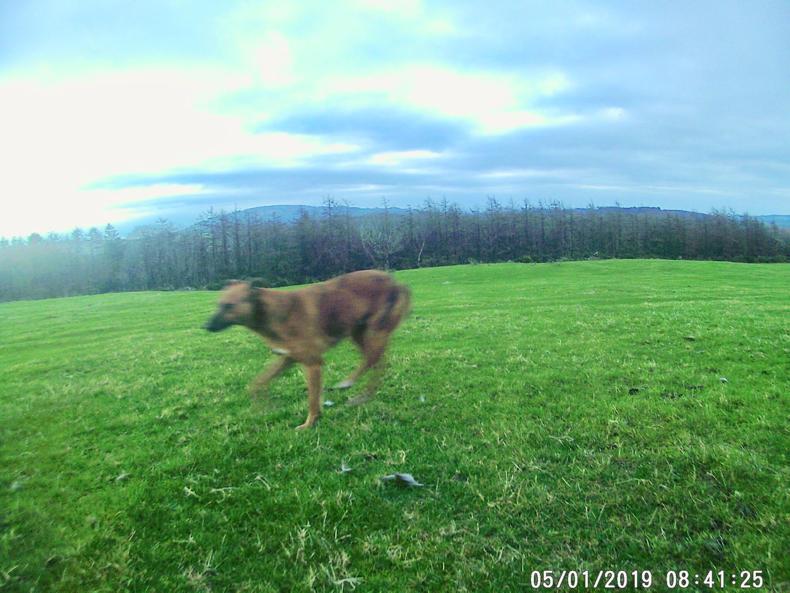
A dog that has killed sheep in Wicklow was captured on camera returning to the field where four sheep were killed. \ Peter Windsor
This week’s Focus centres on putting advance preparations in place to make lambing as straightforward and successful as possible. Unfortunately, all the hard work can be quickly undone by marauding dogs.
Ewes and lambs are particularly vulnerable at this time of year and the immediate loss of dead or injured sheep often masks subsequent losses.
Dog microchipping and licensing legislation was heralded as putting closer scrutiny on dog ownership but it appears to have had little effect. Local authorities and An Garda Síochána are responsible for enforcing the law and it is understandable that sheep farmers are frustrated.
On Tuesday night, the Irish Farmers Journal kicked off a spring series of suckler meetings in Co Leitrim. The importance of the sector and the continued commitment to it by farmers was clear from the large attendance.
As one farmer reflects on our letters page, suckler farmers feel under attack from all sides. Poor beef prices and continuous attempts to undermine the quality of the product is causing real frustration among farmers.
However, for many, the most frustrating aspect is the continuous portrayal of the sector as a sunset industry. The reality is that for the majority of farmers in Leitrim, as in many parts of the country, suckling is far from a sunset industry. Instead, it is a sector that provides a vital source of income to their families and lifeblood to their towns and villages.
In other parts of the country, farmers have embraced the opportunities that dairy expansion has presented but it is important to acknowledge that the dividend from the abolition of milk quotas has not been spread evenly across the country.
Some will argue that this dividend can be spread wider by encouraging farmers to reduce suckler cow numbers and instead provide support services to the dairy sector, in the form of contract-rearing or taking dairy progeny through to beef.
The focus should not be on producing a small cow but instead one that is functional and suited to the production environment
The fact that progeny from the dairy herd formed the backbone of our beef sector in the 1970s and 80s has often been highlighted. But this ignores two important factors: firstly, the dairy cow of 30 years ago had far superior beef traits than is the case today; secondly, farmers had access to growth hormones to improve growth rates and carcase conformation of plainer dairy-bred stock. With the current genetics being used on farms, dairy-beef production is not an economically viable alternative to suckling.

Vet Marie Louise Ryan and beef editor Adam Woods speaking at the Irish Farmers Journal suckler meeting in Leitrim on Tuesday. \ Brian Farrell
So, what are the options for the 400 Leitrim farmers that attended our demonstration on Tuesday night, and indeed the 64,000 farmers with suckler cows? For some, it will be to convert to dairy; for others, contract-rearing calves will be an option. But the reality is that for the vast majority, it will be staying with suckling.
While top of the agenda has to be restoring the level of support provided to these farmers, we have to recognise the failings of the past, where many of the supports were structured in a way that actually incentivised poor practices rather than helping improve on-farm efficiency.
At present, farmers have the opportunity to participate in the Beef Environmental Efficiency Pilot (BEEP). Adam Woods goes into detail on what is required from farmers. Some have criticised the scheme for the lack of funding, which currently stands at €20m. Given the income challenges facing the sector, it is a fair criticism.
However, others have warned farmers not to participate amid fears that weighing cows is the first step to the introduction of a carbon tax on the sector – a view fuelled by the concern that in the context of climate change, the Government’s agenda is to reduce suckler cow numbers to allow future expansion in dairying.
However, we cannot look past the fact that the weight recording measures required under BEEP will deliver an economic and environmental dividend. At farm level, the performance of the calf and subsequent weaning weight is a key driver of output from the suckler herd. Our MartWatch data consistently shows that high weaning prices are underpinned by a factor of weight and conformation.
On the issue of cow size, the focus should not be on producing a small cow but instead one that is functional and suited to the production environment. For most farmers, this will be a 650-680kg cow that can consistently produce a weanling at 300-320kg every year.
Meanwhile, being in a position to prove the environmental dividend from better breeding will give farmers a much stronger argument when it comes to securing direct support for the suckler cow under the environmental schemes introduced in the next CAP. If there is poor participation in BEEP, it will certainly make the argument for introducing a meaningful suckler cow support package much more difficult in Brussels.
Broadband: eir investment a boost but rural farmers left out
Private investment by eir in Ireland’s broadband network is welcome. As Thomas Hubert reports, the company will complete the connection of 335,000 rural homes, farms and businesses by June.
Executives have also revealed that this and further investment in the next five years will cover 80,000 to 100,000 customers previously thought to be dependent on the State-subsidised National Broadband Plan (NBP), mostly in urban areas with poor connectivity.
Company figures indicate that 450,000 customers will remain to be connected by the NBP after eir’s commercial rollout, instead of 530,000 at the latest Government count. While this may seem positive, it also leaves only the more remote farmers and rural dwellers to connect at the highest cost for the operator of the NBP.
The ESB-Vodafone joint venture, SIRO, pulled out of the NBP tender process in September 2017, months after eir announced its current rural broadband rollout.
Industry analysts widely saw the NBP’s narrower focus on the costlier customers as the reason for SIRO’s withdrawal at the time. eir subsequently left the process too.
The Government must now ensure adequate funding and commitment for the NBP to ensure its timely delivery to those who need it most, including the majority of Irish farms.
FTMTA show: latest technology

FTMTA Farm Machinery Show at Punchestown. \ Patrick Browne
In our Machinery supplement this week we carry extensive coverage of the FTMTA machinery show held in Punchestown last week. The well organised event provided farmers and contractors with the opportunity to see the latest equipment and interact with dealers and manufacturers in a relaxed environment.
Despite the uncertainties of Brexit, the mood was upbeat with the TAMS scheme certainly helping to drive demand for sprayers, cultivation equipment, fertiliser spreaders and low-emission spreading equipment.
As we report, the contribution that the McHale family has made to the industry was acknowledged with brothers Padraic and Martin receiving awards.
From its base in Ballinrobe Co Mayo, McHale has become a global player in the grassland equipment market with its engineering successes receiving widespread recognition. We wish the business every success in the years ahead.
Malting barley: growers still waiting on price agreement
It is disappointing to learn that there is still no agreement on price for the bulk of the malting barley crop for 2019. The parties involved, Boortmalt and the IFA, had promised that price negotiation would commence last autumn with the intention of having a price structure in place for 2019, long before the planting season.
Many growers are traditional producers but it remains important that they have transparency on price before they commit to a contract.
While negotiations are always sensitive and complex, it is very important to have an agreement as the industry cannot afford to have more growers abandon the crop.
Dog attacks: sheep flocks require greater protection

A dog that has killed sheep in Wicklow was captured on camera returning to the field where four sheep were killed. \ Peter Windsor
This week’s Focus centres on putting advance preparations in place to make lambing as straightforward and successful as possible. Unfortunately, all the hard work can be quickly undone by marauding dogs.
Ewes and lambs are particularly vulnerable at this time of year and the immediate loss of dead or injured sheep often masks subsequent losses.
Dog microchipping and licensing legislation was heralded as putting closer scrutiny on dog ownership but it appears to have had little effect. Local authorities and An Garda Síochána are responsible for enforcing the law and it is understandable that sheep farmers are frustrated.







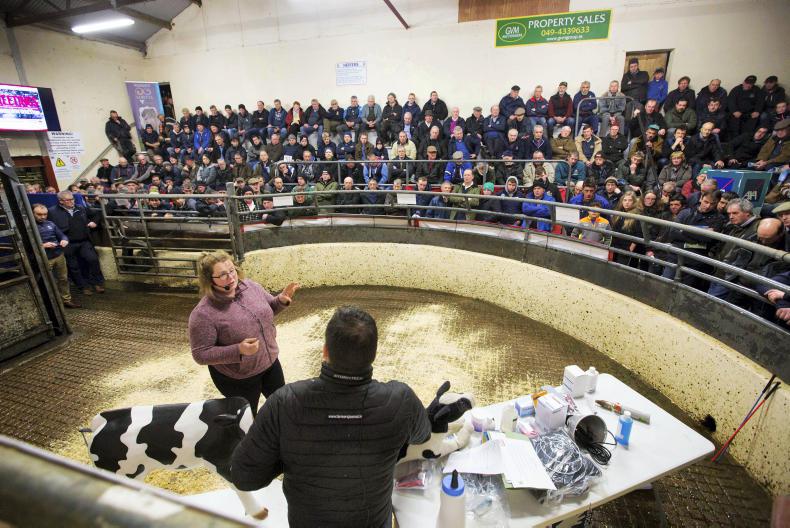

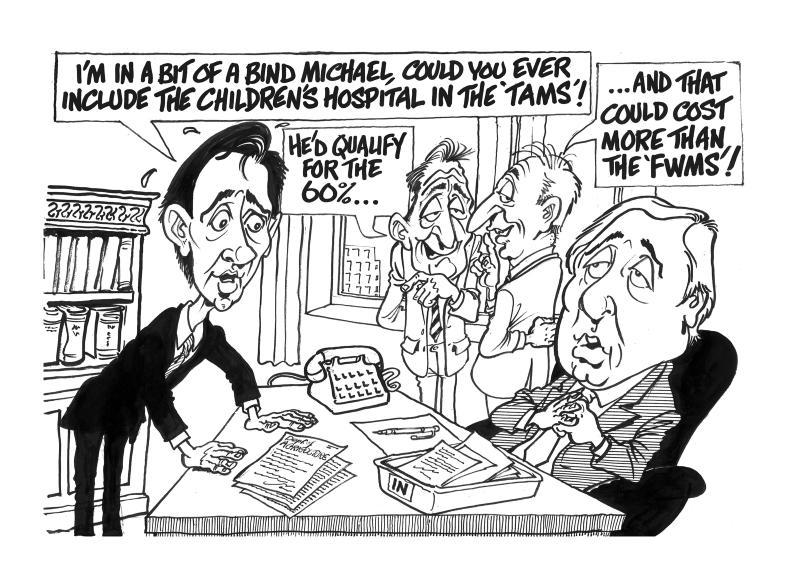
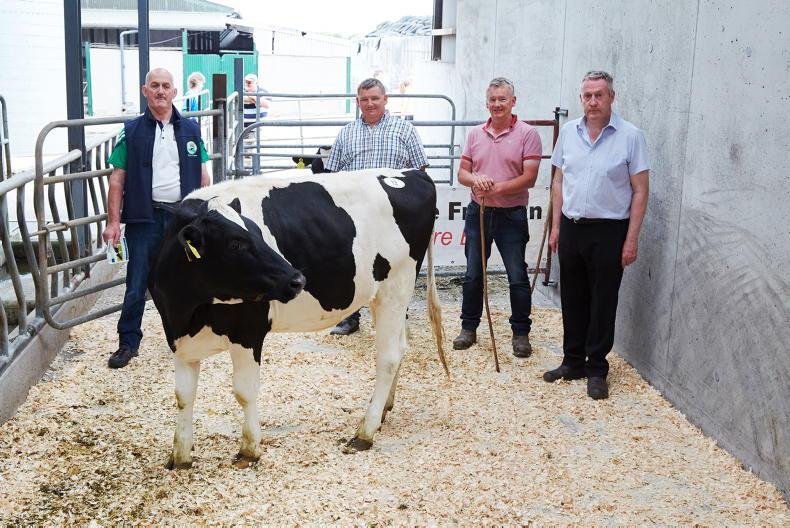

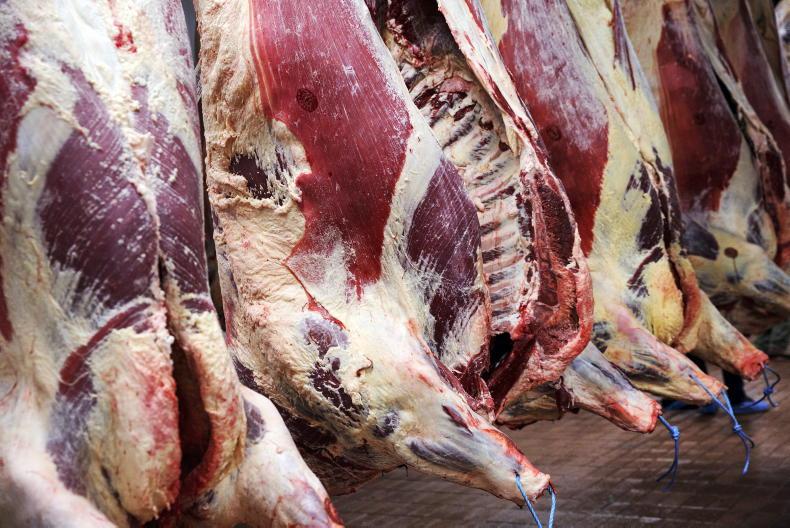
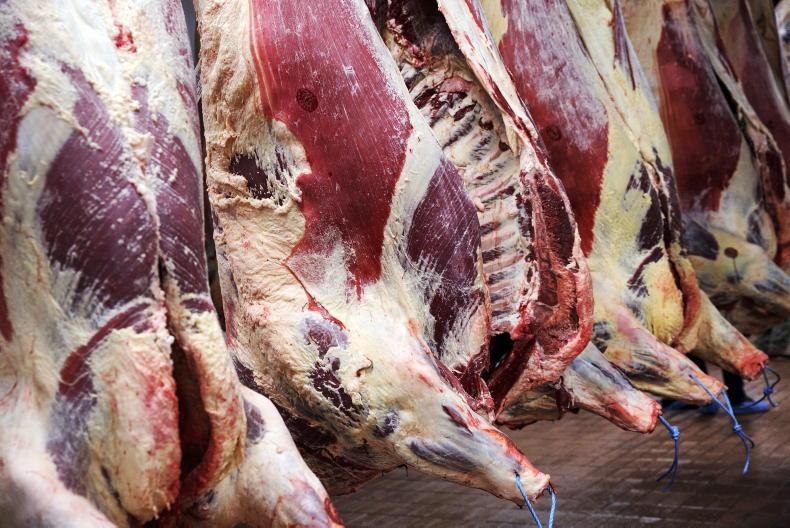
SHARING OPTIONS